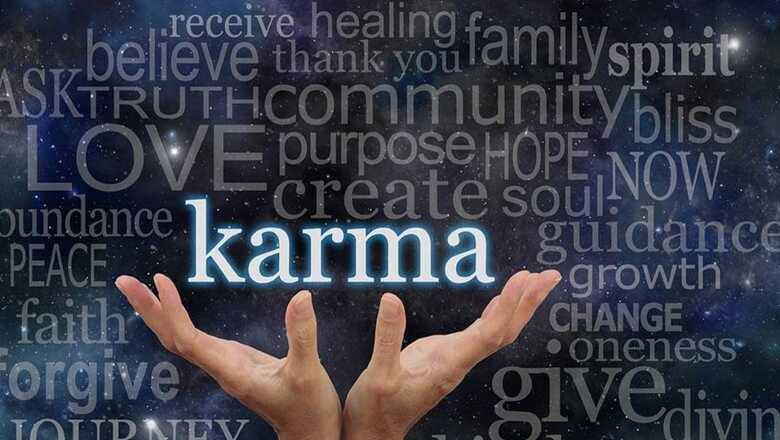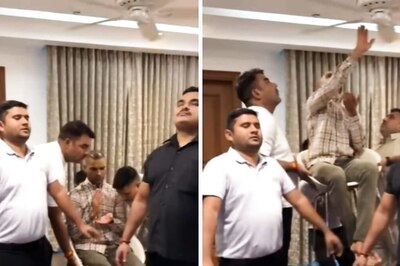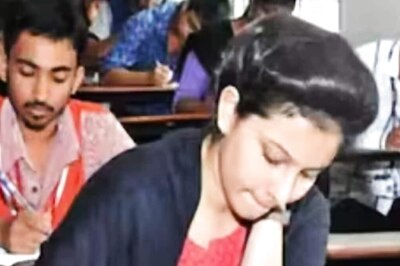
views
No religion gives a satisfactory explanation about the fluctuations in fortunes of both nations and individuals, misfortunes and afflictions that strike suddenly, a lucky streak that emerges from nowhere, genetic defects and deformities that ruin lives, crippling diseases, and crimes and punishments. But answers are discernible when events are examined from the angle of Karma. Karmic explanations often transcend present lives, explore past lives, happenings in previous births, role of the ecosystem, and insist on diligent conduct in this birth to have a peaceful future life.
The term ‘Karma’ means action, a doing, or a deed. It is an old principle from Hindu holy scriptures, later adopted and emphasised by Buddhism and Jainism as the only rational explanation for the law of cause and effect. This spiritual principle also underlines the law of action and reaction. It is impacted by one’s words, thoughts, and actions as well as the action someone else takes under their instructions. Believers of Karma act with caution in all their dealings, whether with humans, animals, insects, or with nature. Karma affects the fortunes of individuals, families, communities, villages, towns, cities, nations, and civilisations. This law of cause and effect is akin to the law of motion in Physics which states that for every action, there is an equal and opposite reaction. It is the operating principle of this universe.
Being universal, the doctrine of Karma is above all religions, absolutely impartial, controlling and determining the course of events. None can intervene in another’s Karma, nor can anybody take upon oneself the Karma of another.
“Every action of our lives touches on some chord that will vibrate in eternity,” said Edwin Hubbell Chapin. Which chord vibrated in what frequency is unknown to mortals, but as events unfold, Karma manifests as fruits of actions. This writer, while working as Commissioner at Patna, had a learned subordinate named A.K. Singh who worked as a Superintendent. Often, there used to be long discussions about politics, the functioning of bureaucracies, the existence of God and rebirth. One day, the discussion revolved around Karma. In the course of the discussion, he brought to my notice a poignant tale prevalent in Eastern India, about the functioning of death, rebirth and Karma.
A pious Brahmin priest who was a great devotee of Lord Jagannath of Puri decided to set out on a pilgrimage. During those ancient days, there was no concept of hotels and lodges. Travelling pilgrims got accommodation and food from philanthropic villagers, in their houses. This Brahmin was welcomed by a childless couple, and given good food and accommodation, and a night’s rest. Well past midnight, the Brahmin was woken up by a gentle knocking on the door. When he opened the door, he was surprised to see the housewife standing. She soon expressed her desire to have sex with him. The Brahmin was aghast and pleaded with her that it would be wrong on his part to deceive her husband who had given him accommodation and sumptuous food. But, the lady argued that it was she who had cooked the food and made the bed, hence she had to be adequately compensated for her efforts, as desired by her. Their mutual arguments dragged on and finally, the exasperated Brahmin blurted out that he would comply with her wishes after the death of her husband. Immediately, the lady rushed into the kitchen, grabbed a knife, went to her bedroom and stabbed to death her sleeping husband. Thereafter, displaying the blood-stained knife, she demanded the Brahmin to keep up his word. Left with no other option, the Brahmin fulfilled her desire but just as the sex act was completed, the lady started screaming, seeking help from the neighbours. When the neighbours entered her house, she pleaded to them, “Look what this scoundrel has done, we gave him food and shelter, yet he murdered my husband and raped me at knifepoint!” The aghast neighbours thrashed the Brahmin mercilessly and thereafter dragged him to the king of the area. The king was appraised of the horrible events, and he ordered that both the hands of the Brahmin be chopped off as punishment for the dastardly crime committed. The punishment was duly carried out.
Surviving on charity, the Brahmin recovered gradually from the traumatic experience undergone. Weighing the future options, he had two alternatives – either go back home or complete the pilgrimage to Puri and then return home. After much deliberation, the Brahmin decided on the second course of action and resumed the journey to Puri.
That night, the king of Puri had a dream, in which Lord Jagannath appeared and directed him to receive his dearest devotee, with all temple honours, and bring him to the temple. The king readily expressed his willingness but sought to know how to identify the devotee, to which the Lord replied that the devotee is easily identifiable as he has no hands.
The king and his minister and bodyguards proceed to the outskirts of Puri and quickly identify the Brahmin without hands. He is received with all temple honours, pomp and pageantry, and escorted into the temple. Standing before the Lord, the bewildered Brahmin asks him, “Why all this drama, where were you when my hands got chopped off?” The Lord replies that it is Karma that has happened. The Lord reveals to him that the Brahmin was his great devotee in his previous birth also. One day, a cow managed to escape from the clutches of a butcher and was fleeing for her dear life. The cow passed by the Brahmin, who was deep in prayer to Lord Jagannath. After some time, the sword-wielding butcher came in search of the cow and enquired from the Brahmin as to which direction the cow went. The Brahmin who was deeply immersed in prayers did not want to speak and disrupt the prayers, so with both his hands, showed the direction in which the cow went.
Settlement of the Karmic account was transferred to the current birth for all those involved. The cow was reborn as the woman and the butcher became her husband in this birth. By killing him with a knife, the woman avenged her killing and settled her karmic account of the previous birth. The Brahmin’s hands were instrumental in causing the cow to be butchered, by the sword. In this birth, that account was settled by both his hands getting chopped off by a sword. Everybody’s karmic accounts were settled in the very same manner as they did to others!
Karma is the operating principle of this world. It works impartially across nations, nationalities, religions, and races, and affects all living and non-living beings. There is no scope for nullifying, neutralising, delegating, or condoning anybody’s Karma. When we read about spine-chilling murders, rapes, wars, and calamities across the world, it is obvious that some force, beyond all religions, is at work, and it is that force that is referred to as Karma.
In our lives, Karma functions like a boomerang. Our actions have a way of coming back at us, either in this birth or in some succeeding birth.
The writer is a retired officer of the IRS and the former director-general of the National Academy of Customs, Indirect Taxes & Narcotics. Views expressed in the above piece are personal and solely that of the author. They do not necessarily reflect News18’s views.




















Comments
0 comment